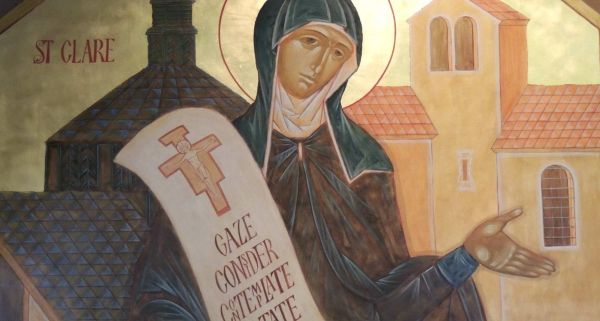Known as Clare of Assisi, an Italian saint and one of the first followers of Francis of Assisi. Inspired by the teachings of St. Francis, she founded the Order of Poor Ladies, a monastic religious order for women in the Franciscan tradition. The Order of Poor Ladies was different from any other order or convent because it followed a rule of strict poverty. Clare wrote their Rule of Life, the first set of monastic guidelines known to have been written by a woman. Following her death, the order she founded was renamed in her honor as the Order of Saint Clare, commonly referred to today as the Poor Clares.
A Life Dedicated To Jesus
As a young girl, Clare dedicated herself to prayer. At 18-years-old, she heard St. Francis of Assisi preach during a Lenten service in the church of San Giorgio and asked him to help her live according to the Gospel. On Palm Sunday in 1212, Clare left her father's home and went to the chapel of the Porziuncula to meet with Francis. While there, Clare's hair was cut off and she was given a plain robe and veil in exchange for her rich gown.
Clare joined the convent of the Benedictine nuns of San Paulo, near Bastia, under Francis' orders. When her father found her and attempted to force her back into his home, she refused and professed that she would have no other husband than Jesus Christ. In order to give her the greater solitude she desired, Francis sent Clare to Sant' Angelo in Panzo, another Benedictine nuns monastery.
Clare's sister Catarina, who took the name Agnes, joined her at this monastery. The two remained there until a separate dwelling was built for them next to the church of San Damiano. Overtime, other women joined them, wanting to also be brides of Jesus and live with no money. They became known as the "Poor Ladies of San Damiano." They all lived a simple life of austerity, seclusion from the world, and poverty, according to a Rule which Francis gave them as a Second Order. St. Clare and her sisters wore no shoes, ate no meat, lived in a poor house, and kept silent most of the time. Their lives consisted of manual labor and prayer. Yet, they were very happy, because Our Lord was close to them all the time.
San Damiano became the center of Clare's new order, which was then known as the "Order of Poor Ladies of San Damiano." For a brief period of time, the order was directed by St. Francis himself and by 1216, Clare became the abbess of San Damiano. Ten years after Clare's death, the order became known as the Order of Saint Clare.
In 1224, an army of rough soldiers from Frederick II came to attack Assisi. Although very sick, Clare went out to meet them with the Blessed Sacrament on her hands. She had the Blessed Sacrament placed at the wall where the enemies could see it. Then on her knees, she begged God to save the Sisters.
"O Lord, protect these Sisters whom I cannot protect now," she prayed. A voice seemed to answer: "I will keep them always in My care." In that moment, a sudden fright struck the attackers and they fled as fast as they could without harming anyone in Assisi.
Credits:
Discriptions of saints lives and biographies have been excerpted, summarized, or compiled from
Franciscan Media,
CatholicSaints.Info,
Catholic Online, and
Wikipedia.

